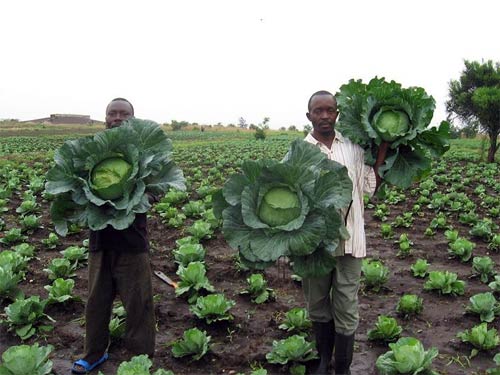New Congo Community Grows Own Food, Saves Millions
By ISKCON News Staff | Mar 25, 2008

The Democratic Republic of Congo’s new Varnashrama community appears to be going against the global trend of rapidly increasing food prices. As a UN aid official recently commented to global news agency AFP, "The Philippines [government] may end up having to feed people to save them going hungry as the market price of rice soars out of reach of ordinary households."
It’s not the only alarm bell. On March 1, 2008, Anthony Faiola reported in the Washington Post that the U.S. government’s humanitarian relief agency would have to significantly scale back emergency food aid to some of the world’s poorest countries this year because of soaring global food prices.
Officials at the U.S. Agency for International Development said: "A forty-one percent surge in prices for wheat, corn, rice and other cereals over the past six months has generated a $120 million budget shortfall that will force us to reduce emergency operations." That deficit is projected to rise to $200 million by the end of the year.
In contrast, The Varnashrama Project in Eastern Congo is paying just three cents a meal to feed their workers. Since Working Villages International began the project in 2006, they have put seventy-five acres of land under irrigated cultivation, producing enough food for one thousand people. What’s more, project volunteer Kapiladeva Dasa expects food costs to steadily decrease until May, when one meal per worker will cost nothing at all outside of investment.
By selling surplus crops in the nearby city of Bukavu, The Varnashrama Project not only spends virtually nothing on workers’ food costs, but can cover their wages as well, saving the community a further $1.65 million per year. "By the time we reach agricultural self-sufficiency in May, we will have spent under $50,000 to build our agricultural infrastructure," says Kapiladeva. "That leaves us with a return of twenty-seven times the invested capital, in the first year alone. And that will grow to two hundred times the initial investment by the end of the eight years it takes to complete the project."
The secret to the Varnashrama Project’s success is self-reliance. Instead of treating their farm’s production as a cash crop to sell off on the market, they derive far more value by eating what they grow. And that value is not just economical. Workers have found that their diets vastly improve since joining the project. They enjoy over ninety different varieties of crops, all of which are grown organically and are therefore especially high in nutrition. "Take one look at our workers, and you’ll see that their families are now stronger, healthier and more energetic than other people in the Valley – and happier too," Kapiladeva says.
Working Villages International also helps villagers employed with them by training them in advanced techniques of sustainable agriculture. Within eight years, they hope, most will use their training to develop farms of their own, bringing a lasting improvement to the whole valley and a solid economic base for the Varnashrama Project.
"When the village is completely up and running, we will not only produce our own food, but also build our own housing, and manufacture our own clothing and agricultural tools," says Kapiladeva. "Everything the residents need for a happy, full life will be produced within the village. We are not looking at this project as an investment in the way a business investor would – the success of the community is in how much the lives of the people and animals living in it can be enriched."














